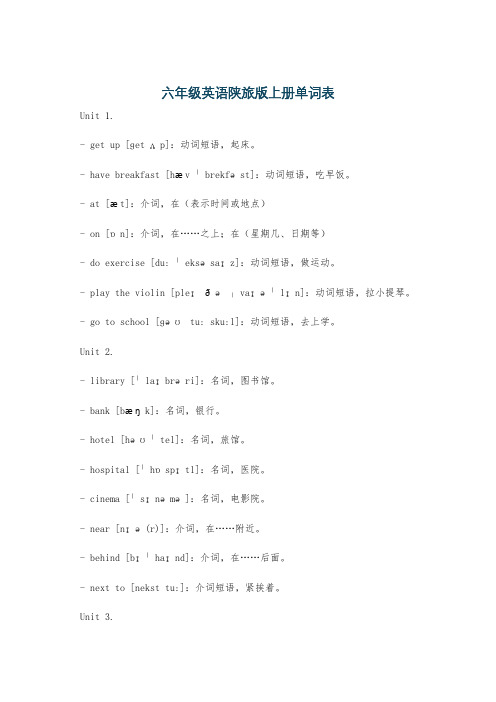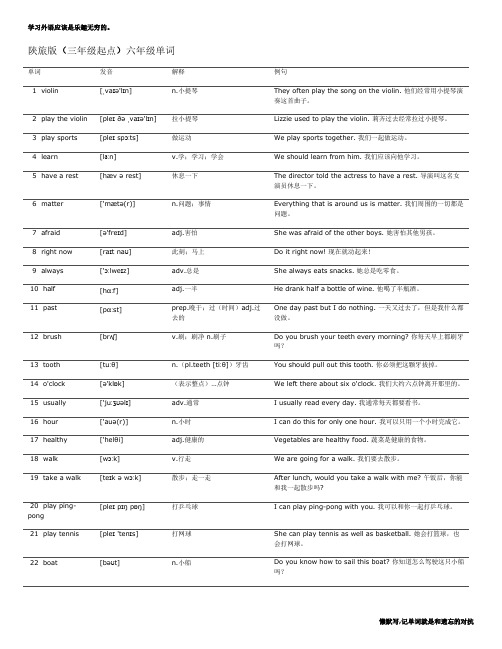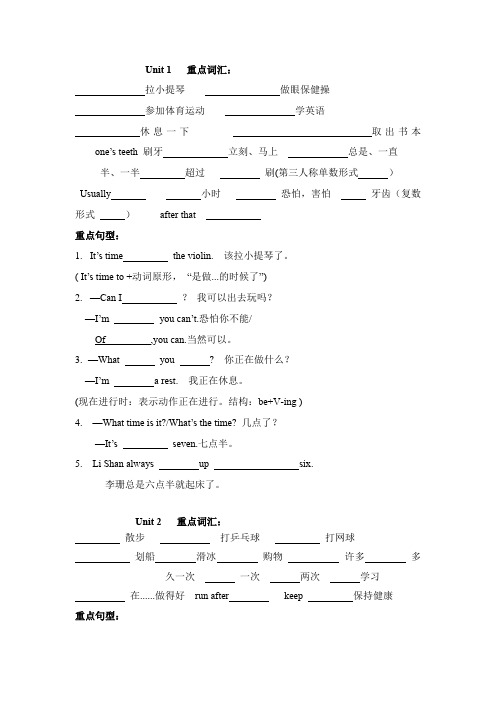陕旅版小学英语六年级英
六年级英语陕旅版上册单词表

六年级英语陕旅版上册单词表Unit 1.- get up [ɡet ʌp]:动词短语,起床。
- have breakfast [hæv ˈbrekfəst]:动词短语,吃早饭。
- at [æt]:介词,在(表示时间或地点)- on [ɒn]:介词,在……之上;在(星期几、日期等)- do exercise [du: ˈeksəsaɪz]:动词短语,做运动。
- play the violin [pleɪðəˌvaɪəˈlɪn]:动词短语,拉小提琴。
- go to school [ɡəʊ tu: sku:l]:动词短语,去上学。
Unit 2.- library [ˈlaɪbrəri]:名词,图书馆。
- bank [bæŋk]:名词,银行。
- hotel [həʊˈtel]:名词,旅馆。
- hospital [ˈhɒspɪtl]:名词,医院。
- cinema [ˈsɪnəmə]:名词,电影院。
- near [nɪə(r)]:介词,在……附近。
- behind [bɪˈhaɪnd]:介词,在……后面。
- next to [nekst tu:]:介词短语,紧挨着。
Unit 3.- week [wi:k]:名词,周;星期。
- today [təˈdeɪ]:名词,今天。
- Sunday [ˈsʌndeɪ]:名词,星期日。
- Monday [ˈmʌndeɪ]:名词,星期一。
- Tuesday [ˈtju:zdeɪ]:名词,星期二。
- Wednesday [ˈwenzdeɪ]:名词,星期三。
- Thursday [ˈθɜ:zdeɪ]:名词,星期四。
- Friday [ˈfraɪdeɪ]:名词,星期五。
- Saturday [ˈsætədeɪ]:名词,星期六。
Unit 4.- season [ˈsi:zn]:名词,季节。
- spring [sprɪŋ]:名词,春天。
陕旅版六年级英语上册全册各单元知识总结

Unit 1It's Time to Play the Violin一、核心词汇1. 名词: violin 小提琴tooth 牙齿hour 小时2. 副词: always 总是;一直usually 通常;常常o'clock……点钟3. 动词: learn 学习brush 刷;擦4. 短语: play the violin 拉小提琴do eye exercises 做眼保健操play sports 参加体育活动learn English 学英语have a rest 休息一下take out the book 取出书本right now 立刻;马上5. 其他: matter 要紧;重要afraid 恐怕;害怕half 半;一半past 超过;超出二、拓展词汇1. 名词: time 时间Saturday星期六morning早上afternoon下午breakfast 早饭dinner晚饭face脸2. 动词及其第三人称单数形式: get(s)得到brush(es)刷;擦wash(es)洗run(s)跑watch(es)看;注视play(s)玩;弹奏go(es)去;走3. 代词: my我的your你的her她的I我you你she她it它4. 副词: first首先;第一then 然后5. 介词: after 在……以后on/at/in在……之时with和6. 短语: cook dinner 做晚饭go to bed 去睡觉go swimming 去游泳brush my teeth刷牙have lunch吃午饭watch TV 看电视read a book 看书do my homework 做家庭作业get up 起床三、核心句型1. — What time do you usually get up? 你通常几点起床?— I get up at seven. 我七点起床。
解读: 这是用于询问某人在什么时间做某事及其回答的句型。
小学英语单词陕旅版(三年级起点)六年级(完整版)

陕旅版(三年级起点)六年级单词单词发音解释例句1 violin[ˌvaɪə'lɪn]n.小提琴They often play the song on the violin. 他们经常用小提琴演奏这首曲子。
2 play the violin[pleɪ ðəˌvaɪə'lɪn]拉小提琴Lizzie used to play the violin. 莉齐过去经常拉过小提琴。
3 play sports[pleɪ spɔːts]做运动We play sports together. 我们一起做运动。
4 learn[lɜːn]v.学;学习;学会We should learn from him. 我们应该向他学习。
5 have a rest[hæv ə rest]休息一下The director told the actress to have a rest. 导演叫这名女演员休息一下。
6 matter['mætə(r)]n.问题;事情Everything that is around us is matter. 我们周围的一切都是问题。
7 afraid[ə'freɪd]adj.害怕She was afraid of the other boys. 她害怕其他男孩。
8 right now[raɪt naʊ]此刻;马上Do it right now! 现在就动起来!9 always['ɔːlweɪz]adv.总是She always eats snacks. 她总是吃零食。
10 half[hɑːf]adj.一半He drank half a bottle of wine. 他喝了半瓶酒。
11 past[pɑːst]prep.晚于;过(时间)adj.过去的One day past but I do nothing. 一天又过去了,但是我什么都没做。
陕旅版六年级上册英语全册教学课件

Colin: Can I go out to play, Mom? Mom: I’m afraid your can’t. It’s time to pla
the violin. Colin: Can I go out to play after that? Mom: Of course, you can. Colin: Thank you, Mom. I’ll play the violin
【例句】 ——What is your brother doing?
你哥哥在干什么? ——He is reading a book.
他正在读书。
【巧记】be动词跟着主语的变化而变化, 变化口诀:
我用am,你用are, is连着他她它, 男他女她动物它。 还有we, 还有they, we、they我们都用are。
取出书本 要紧 恐怕;害怕 立刻;马上
New words
Look and circle What do you do every day?
cook dinner 做晚饭
go to bed 去睡觉
go swimming 去游泳
brush my teeth 刷牙
have lunch 吃午饭
watch TV 看电视
play后面接棋牌类、球类名词时,名词 前不加定冠词the。如: play basketball 打篮球 play football 踢足球 play ping-pong 打乒乓球 play volleyball 打排球 play baseball 打棒球 play badminton 打羽毛球
3.It doesn’t matter. 没关系。 此句子常用来表示接受对方的道歉。matter作动 词时,常用于否定句和疑问句中。 【例句】—Sorry, I’m late. 对不起,我迟到了
六年级上册英语单词陕旅版

六年级上册英语单词陕旅版Unit 1.1. get up [ɡet ʌp]:动词短语(v. phr.),起床。
2. have breakfast [hæv ˈbrekfəst]:动词短语(v. phr.),吃早饭。
3. go to school [ɡəu tu: sku:l]:动词短语(v. phr.),去上学。
4. lunch [lʌntʃ]:名词(n.),午饭。
5. have lunch [hæv lʌntʃ]:动词短语(v. phr.),吃午饭。
6. go home [ɡəu həum]:动词短语(v. phr.),回家。
7. dinner [ˈdinə]:名词(n.),晚饭。
8. have dinner [hæv ˈdinə]:动词短语(v. phr.),吃晚饭。
9. watch TV [wɔtʃˈti:ˈvi:]:动词短语(v. phr.),看电视。
10. go to bed [ɡəu tu: bed]:动词短语(v. phr.),上床睡觉。
Unit 2.1. season [ˈsi:zn]:名词(n.),季节。
2. spring [spriŋ]:名词(n.),春天。
3. warm [wɔ:m]:形容词(adj.),温暖的。
4. fly kites [flai kaits]:动词短语(v. phr.),放风筝。
5. summer [ˈsʌmə]:名词(n.),夏天。
6. hot [hɔt]:形容词(adj.),热的。
7. swim [swim]:动词(v.),游泳。
8. autumn [ˈɔ:təm]:名词(n.),秋天。
9. cool [ku:l]:形容词(adj.),凉爽的。
10. pick apples [pik ˈæplz]:动词短语(v. phr.),摘苹果。
11. winter [ˈwintə]:名词(n.),冬天。
12. cold [kəuld]:形容词(adj.),寒冷的。
六年级英语陕旅版上册

陕旅版六年级英语上册一、教材整体特点陕旅版六年级英语上册教材内容丰富,涵盖了听、说、读、写等多个方面的训练。
教材注重培养学生的综合语言运用能力,通过有趣的话题和活动,激发学生的学习兴趣。
二、重点词汇解析1.museum /mjuˈziːəm/ 博物馆-例句:We went to the museum last weekend.(我们上周末去了博物馆。
)-记忆方法:可以将“museum”拆分成“mu”“se”“um”三个部分来记忆,同时联想博物馆里有很多有趣的展品。
2.bookstore /ˈbʊkstɔː(r)/ 书店-例句:I want to buy a book in the bookstore.(我想在书店买一本书。
)-拓展:bookshop 也表示书店。
3.hospital /ˈhɒspɪtl/ 医院-例句:My mother is a doctor. She works in a hospital.(我的妈妈是一名医生。
她在医院工作。
)-联想:doctor(医生)、nurse(护士)等与医院相关的词汇。
4.cinema /ˈsɪnəmə/ 电影院-例句:Let's go to the cinema to watch a movie.(我们去电影院看电影吧。
)-拓展:film(电影)、ticket(票)等与电影院相关的词汇。
5.post office /ˈpəʊst ˈɒfɪs/ 邮局-例句:I need to send a letter. I will go to the post office.(我需要寄一封信。
我要去邮局。
)-联想:stamp(邮票)、envelope(信封)等与邮局相关的词汇。
6.by /baɪ/ 乘;通过-例句:I go to school by bus.(我乘公交车去上学。
)-用法:by + 交通工具,表示乘坐某种交通工具。
7.on foot 步行-例句:I go to the park on foot.(我步行去公园。
陕旅版小学六年级上册英语Unit 1 重点词汇

Unit 1重点词汇:拉小提琴做眼保健操参加体育运动学英语休息一下取出书本one’s teeth 刷牙立刻、马上总是、一直半、一半超过刷(第三人称单数形式)Usually 小时恐怕,害怕牙齿(复数形式)after that重点句型:1.It’s time the violin. 该拉小提琴了。
( It’s time to +动词原形,“是做...的时候了”)2.—Can I ?我可以出去玩吗?—I’m you can’t.恐怕你不能/Of ,you can.当然可以。
3.—What you ? 你正在做什么?—I’m a rest. 我正在休息。
(现在进行时:表示动作正在进行。
结构:be+V-ing )4.—What time is it?/What’s the time? 几点了?—It’s seven.七点半。
5.Li Shan always up six.李珊总是六点半就起床了。
Unit 2 重点词汇:散步打乒乓球打网球划船滑冰购物许多多久一次一次两次学习在......做得好run after keep 保持健康重点句型:1.I’m . 我是健康的。
2.— do you drink milk? 你多久喝一次牛奶?—I drink milk . 我每天喝一次牛奶。
3.— does Li Shan go ? 李珊多久滑一次冰?—She goes skating .她一周滑一次冰.4.You look . 你看起来很健康。
5.I eat fruits and vegetables. 我吃许多水果和蔬菜。
6.She her . 她在学习方面表现得好。
六年级上册英语书陕旅版单词表

六年级上册英语书陕旅版单词表Unit 1.- get up [ɡet ʌp] (动词短语)起床。
- have breakfast [hæv ˈbrekfəst] (动词短语)吃早饭。
- go to school [ɡəʊ tuː skuːl] (动词短语)去上学。
- lunch [lʌntʃ] (名词)午饭。
- have lunch [hæv lʌntʃ] (动词短语)吃午饭。
- dinner [ˈdɪnə(r)] (名词)晚饭;正餐。
- have dinner [hæv ˈdɪnə(r)] (动词短语)吃晚饭。
- go to bed [ɡəʊ tuː bed] (动词短语)上床睡觉。
Unit 2.- season [ˈsiːzn] (名词)季节。
- spring [sprɪŋ] (名词)春天。
- warm [wɔːm] (形容词)暖和的。
- summer [ˈsʌmə(r)] (名词)夏天。
- hot [hɒt] (形容词)热的。
- autumn [ˈɔːtəm] (名词)秋天。
- cool [kuːl] (形容词)凉爽的。
- winter [ˈwɪntə(r)] (名词)冬天。
- cold [kəʊld] (形容词)冷的。
Unit 3.- month [mʌnθ] (名词)月。
- January [ˈdʒænjuəri] (名词)一月。
- February [ˈfebruəri] (名词)二月。
- March [mɑːtʃ] (名词)三月。
- April [ˈeɪprəl] (名词)四月。
- May [meɪ] (名词)五月。
- June [dʒuːn] (名词)六月。
- July [dʒuːˈlaɪ] (名词)七月。
- August [ˈɔːɡəst] (名词)八月。
- September [sepˈtembə(r)] (名词)九月。
- October [ɒkˈtəʊbə(r)] (名词)十月。
- 1、下载文档前请自行甄别文档内容的完整性,平台不提供额外的编辑、内容补充、找答案等附加服务。
- 2、"仅部分预览"的文档,不可在线预览部分如存在完整性等问题,可反馈申请退款(可完整预览的文档不适用该条件!)。
- 3、如文档侵犯您的权益,请联系客服反馈,我们会尽快为您处理(人工客服工作时间:9:00-18:30)。
陕旅版小学英语六年级英第一篇:陕旅版小学英语六年级英陕旅版小六年级英根据上下文的意思,把下列的句子补充完整。
1, A: _________ did you come here this morning?B: I _________ here by bus.2, A: _________ Jim play basketball every day?B: No, but he ________ basketball with us yesterday afternoon.3, A: How many books _________ there on the desk?B: There _______ one book on it.4,A: Is he ________ strongest in your class?B: No, I am _______ than him.5,A:________ you a good student now?B: No, I am going to _______ a good student.6,A:________ did you go to last weekend?B: I _______ to my uncle’s home.7,A:_______ Tom clean his room in the morning every day?B: Yes, but he _______ his room in the afternoon yesterday.8,A: _______ there a book on the desk?B: oh, there _______ three books on the desk.9,A:Is this room ________ biggest in this building?B: No, that room is ______ than this one.10,A:________ they teachers now? B: No, but they are going to _______ teachers next year.11,A:_______ did you have for supper yesterday?B:I_______ rice, fish and vegetables.12,A:_______ he help you do your homework every day?B: No, but he_______ me do my homework yesterday.13,A: What_______ you going to do next Saturday?B: I _______ going to see my grandma.14,A:Are you _______shortest in your class? B: No, Li Lei is ________ than me.15,A: _______ it very hot today? B: Yes, but it is going to _______ cool tomorrow.16,A: _______ did you go to school yesterday?B: I ________ school by bike.17,A: ________ you watch TV every evening? B: No, but I am _______ TV now.18,A: What ________ Li Hua usually have after supper? B: He usually _______ a cup of tea.19,A: Is Zhang Hua shorter than you? B: No, He is ________ than _______.20,A: How many pens ________ there in your pencil-box? B: There _______ one.21,A:_______ did you go to the library? B: I _______ there last Saturday.22, A: _______ you usually draw on Saturday? B: Yes, and I am _______ now.23,A: What _______ Li Ming have for breakfast every day? B: His ________ congee and vegetables.25,_______ there a library in your school? B: Yes, and there _______ a lot of books in it.26, A:_______ did you go yesterday? B: I _______ to see the doctor.27,A:________ you usually cook yourself? B: Yes, look, I am _______ now.28,A: What ________ Li Hua usually do after supper? B: He usually _______ his homework.29,A:________ are you going to buy? B: I _______ going to buy a red skirt.30,A: ________ your mother get up at six every morning? B: Yes, but she _______ up at seven yesterday morning.31,A: Is the red coat ________ dearest? B: No, it is _______ than the purple one.32,A:________ you give me this picture? B: Of course, but you _______ show it to anybody.33, A:_______ there any water in that bottle?B: Yes, and there ________ three fishes in it.34, A: _______ are you going to go to the party tomorrow? B: I ________ going to go by car.35,A:_______ he usually have breakfast at seven o’clock? B: No, but he ________ breakfast at seven yesterday.36,A: Are you ________ tallest in your family? B: No, I am ________ than my brother.37,A:_______ I do my homework here? B: Yes, but you________ talk here.38,A: _______ there any pictures in your room? B: Yes, there _______ a picture of Lei Feng.39,A:_______ are you going to go this Saturday? B: I ______ going to go to the park with my friends.40,A:_______ Miss.Ma usually go to work by bus? B: No, but she ______ to work by bus yesterday.41, A: Is Tom ______ oldest in your class? B: No, he is _______ than me.42,A:_______ we cross the street here? B: Yes, but you _______ cross the street at a green light.43,A:_______ there a pencil-box in your bag? B: Yes, there ______ two pencils and an eraser in it.三、补全对话。
1, A: Do you usually go to the school library on Sunday?B: Yes, ____________.A: ________________________________________?B: I read books there.A: Can I borrow the books there?B: Yes, ______________.A: ______________________________?B: You can keep the books for two weeks.A: Are you going to go to the library next Sunday?B: No, ______________.But I am going to go there next Sunday.A: Ok, I will go with you.2,Li Hua: Hello, Xiao Mei.____________________________? Xiao Mei: We went to visit an old man yesterday.Li Hua: Did you help him do housework? Xiao Mei: Yes, ___________.We helped him clean his room and wash clothes.Li Hua: ______________________________.Xiao Mei: We stayed there for 4 hours.Li Hua: Were you very tired?Xiao Mei: _________, but very happy.Are you going to go with us next Sunday? Li Hua: Yes, ____________.3,T om: _____________________________________? Mary: I usually go to the country for the summer holidays.Tom: ______________________________________? Mary: My grandfather lives there.Tom: Is he very glad to see you? Mary: Yes, __________.T om: Does he take you to visit his farm? Mary: Yes, ________________________.T om: Do you like it? Mary: No,______________________.四、选择填空。
